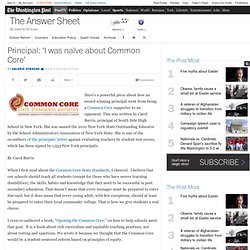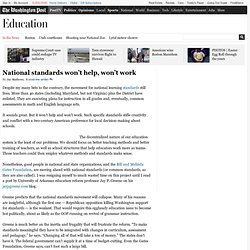

Indiana halts Common Core implementation. Indiana, one of the most education reform-minded states in recent years, is postponing implementation of the Common Core initiative so that there can be more discussion on the quality and impact of the standards.

Gov. Mike Pence signed a bill Saturday that halts implementation as of Wednesday, a compromise between forces that want the Common Core to go forward because they say they will raise academic achievement, and forces who believe the standards are not as good as Indiana’s old ones and want education decisions to be local. New public hearings on the Core will be held, and by the start of 2015, the State Board of Education will have to vote again to go ahead with it, as it did in 2010, or stop it permanently, according to the Indianapolis Star.
There will also be a cost analysis done on core implementation. Indiana is one of the handful of states that are either pulling back or considering halting the standards, including Alabama, South Dakota and Georgia. Principal: ‘I was naïve about Common Core’ Here’s a powerful piece about how an award-winning principal went from being a Common Core supporter to an opponent.

This was written by Carol Burris, principal of South Side High School in New York. She was named the 2010 New York State Outstanding Educator by the School Administrators Association of New York State. She is one of the co-authors of the principals’ letter against evaluating teachers by student test scores, which has been signed by 1,535 New York principals. By Carol Burris When I first read about the Common Core State Standards, I cheered. I even co-authored a book, “Opening the Common Core,” on how to help schools meet that goal. I confess that I was naïve. I hear about those distortions every day. Kings and queens COMMISSIONED Mozart to write symphonies for celebrations and ceremonies. Whether or not learning the word ‘commission’ is appropriate for second graders could be debated—I personally think it is a bit over the top. Test scores are a rough proxy for learning. The Secret Sixty Prepare to Write Standards for 50 Million - Living in Dialogue.
National standards won’t help, won’t work. The decentralized nature of our education system is the least of our problems.

We should focus on better teaching methods and better training of teachers, as well as school structures that help educators work more as teams. Those teachers could then employ whatever methods and standards make sense. Nonetheless, good people in national and state organizations, and the Bill and Melinda Gates Foundation, are moving ahead with national standards (or common standards, as they are also called). I was resigning myself to much wasted time on this project until I read a post by University of Arkansas education reform professor Jay P.
Greene on his jaypgreene.com blog. Greene predicts that the national standards movement will collapse. Greene is much better on the inertia and frugality that will frustrate the reform. His last argument is the most interesting. That makes sense. We already have all the national standards we need from decades of states borrowing one another’s ideas. Time for Teacher Unions to Hop Off the Common Core Train - Living in Dialogue. Education standards: Best and brightest. New Education Standards Face Growing Opposition. Richard Perry/The New York Times Randi Weingarten, president of the American Federation of Teachers, at the Green Dot New York Charter School in the Bronx.

Tea Party conservatives, who reject the standards as an unwelcome edict from above, have called for them to be severely rolled back. Indiana has already put a brake on them. The Michigan House of Representatives is holding hearings on whether to suspend them. And citing the cost of new tests requiring more writing and a significant online component, Georgia and Oklahoma have withdrawn from a consortium developing exams based on the standards.
At the same time, a group of parents and teachers argues that the standards — and particularly the tests aligned with them — are simply too difficult. Those concerns were underscored last week when New York State, an early adopter of the new standards, released results from reading and math exams showing that less than a third of students passed. ‘White suburban mom’ responds to Arne Duncan.